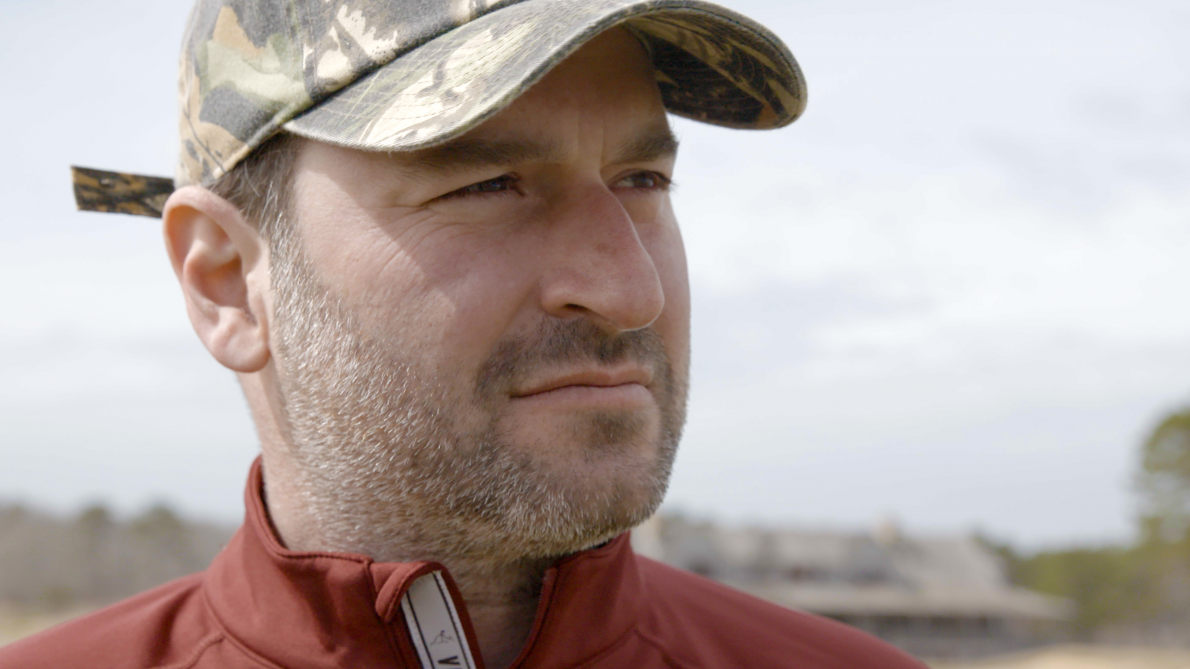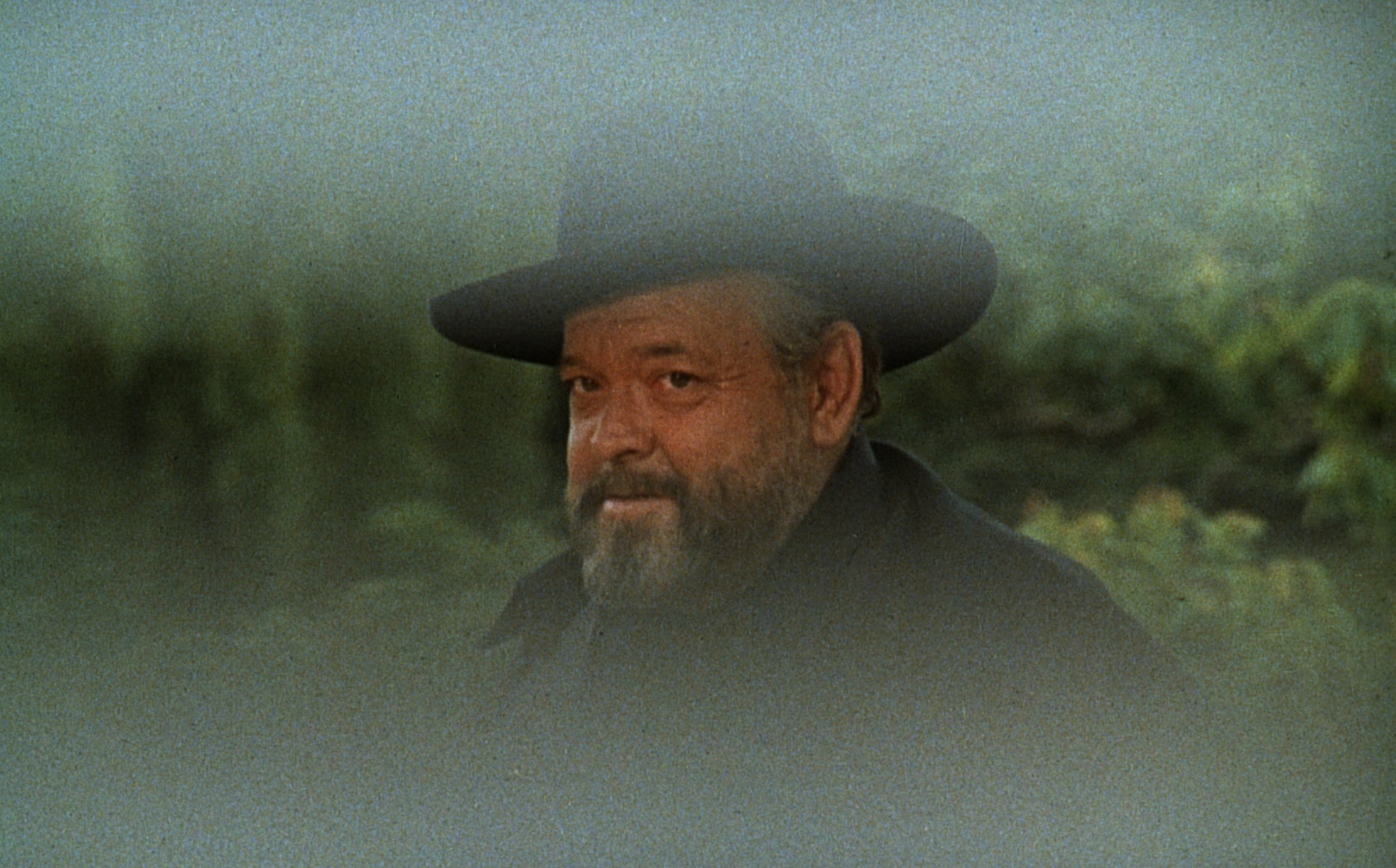Anyone who knew Harold Nisker might have dubbed him a “health nut.” Active well into his 80s, Nisker always received a clean bill of health from the doctors and exercised regularly. His passion was golf and, as Harold’s son Andrew portrays in the documentary Ground War, the elder Nisker was a staple on the links at his local club.
However, Harold Nisker died from Non-Hodgkins Lymphoma, a form of blood cancer. His illness surprised his friends and family, especially Andrew, as they tried to understand how such a health-conscious person could have developed the disease. Andrew’s search for answers fuels Ground War as the site of his father’s beloved golf course provides the likely catalyst for the cancer that killed him. Nisker’s research uncovers all sorts of nasty carcinogens and toxic chemicals used to keep the course so manicured and green. At the core of the film is a heartfelt interrogation of how any private club, municipality, or corporation could use products that harm the people using recreational space.
Nisker’s quest leads him to everyday activists who fight for change in their communities. Speaking with ordinary citizens concerned about the harmful effects of toxic chemicals used in public green space, Nisker provides accounts of people harmed simply by enjoying their routines, unaware of the invisible elements harming their health and devastating the planet. He also finds voices from other corners, like Scotland, where communities have banned harmful products without sacrificing the pleasure that people derive from public space. Ground War asks audiences to reconsider the value of a landscape that serves more cosmetic than practical function. Nisker, a veteran of green documentary filmmaking after The Dark Side of Chew, which looked at the environmental impact of chewing gum, and Orange Witness, which gives voice to people exposed to and affected by Agent Orange, approaches the study with an emotional and intellectual plea that addresses the issue from multiple angles.
Ground War is particularly significant in light of one headline-making eco hero this year. Back in August, Dewayne Lee Johnson won a major victory when a jury at the San Francisco Superior Court ordered chemical manufacturer Monsanto to pay $289 million in damages, citing the company acted with “malice and oppression” by making the weed killer Roundup, which Johnson used during his work as a groundskeeper. He ultimately developed terminal Non-Hodgkins lymphoma as a result of the undisclosed effects of the chemical. Johnson doesn’t appear in Ground War, but Nisker’s film falls perfectly in line with the case. Neither Johnson nor Nisker seeks to be a David against a Goliath; rather, both men simply advocate for corporations to be held accountable for manufactured products that kill people. Johnson argues that his fight continues and the film puts his plight within a global movement seeking to inspire change.
Ground War makes its Canadian Premiere this weekend as the Closing Night selection of Toronto’s Planet in Focus Environmental Film Festival. POV chatted with Nisker by phone ahead of the festival to talk golf, green space, and documentary filmmaking in the age of “Fake News.” Nisker will be joined by Dewayne Lee Johnson at the festival.
POV: Pat Mullen
AN: Andrew Nisker
This interview has been edited for brevity and clarity.
POV: Tell me about your relationship with your father. Did you ever worry that you were too close to our subject?
AN: I was driven into making this film because of my father, but the story itself was made after he passed away, using archival. A complicated part was trying to weed through his life and tell a story that I felt was accurate and captured the essence of who he was so that people would understand why I was driven to make the film.
POV: How have the current members of his golf course reacted to the information you’ve discovered?
AN: At this point there’s been no comment. They didn’t want to participate in the film.
POV: And you don’t name the course. Can you speak to that decision?
AN: I don’t name the course in the film because it’s kind of irrelevant. These are practices that are done on golf courses across Canada. I didn’t see any need to single them out because what they are doing is legal and they are no different than anybody else in the industry. Some courses use more [pesticides], some courses use less, but the good thing is the transparency is available through the reports that are available online.
POV: I wanted to ask you about that. I saw that the Integrated Pest Management Council of Canada has these reports. How useful are they? How can a layperson with no knowledge of what these products are or what they do make sense of these reports?
AN: They’re extremely useful, but you need to do your research to understand what you’re reading and how much [of a certain chemical] is being used and when it’s being used. You can read about the chemicals’ histories: where they’ve been used in the past and why they are not allowed to be used in certain places. Each chemical has a story and probably has hundreds of pages written about it.
POV: I watched Ground War the same day that Toronto mayoral candidate Jennifer Keesmaat announced her proposal to transform municipal golf courses into other recreational land. Do you think this is a good idea regardless of who is the next mayor of Toronto, or any city, given the health concern that some chemicals on golf courses pose to the public?
AN: I’m a pro-golf course kind of a guy. I’m just not into the way that they are managed from a chemical standpoint. I’ve been to some beautiful golf courses that use no pesticides. If they’re treated as public spaces as they are in Scotland, where the public is welcome to come use the courses, walk on the grounds and enjoy them when they’re not being used for golf, they represent wonderful park land. They’re also good green watershed in places that initially weren’t surrounded by subdivisions and developments.
Many of these golf courses were built before urban sprawl. They preserved green space within the community. If you eliminate the use of a golf course, maybe you turn it into a park, but often cities will sell off half the land to a developer. Then you have land that’s being intensively polluted by urban sprawl, which is far worse than the use of pesticides on golf courses.
POV: True. What did you learn from the other countries you visited for the film?
AN: G.E.O., the Golf Environmental Organization in Scotland, showed me their golf course, which had been there for 150-200 years. If it wasn’t there, it would all be buildings. They preserved that land by the seaside, which is a beautiful spot for people to go and walk and enjoy.
In Toronto, our lakeshore has been completely cut off by a highway. If it remained parkland or there was something to preserve, we would still have a beautiful lakeshore, but we don’t. That’s what happens when land is given up. It never comes back. For example, Sunnyside was a beautiful fairground and park before the Gardiner was put up and now it’s just a little patch of beach and they’ve been cut off from the lake. These are questions about urban development and sprawl that are in the scope of the film.
POV: Yes, it raises a lot of those questions. In my own neighborhood, the closest thing to green space is a cemetery. But, in the same way, is cultivated with pesticides for mostly cosmetic reasons.
AN: If you look at the IPM reports, the city golf courses use extremely small amounts of pesticides compared to golf courses that are more private because they do not have budgetary restraints. It’s also expected that the golf courses are a little rough and tumble. I’m trying to argue that rough and tumble doesn’t necessarily mean it’s a poor quality—it’s just a different type of experience. Golf was originally enjoyed on the links land, which is barren wasteland between the sea and arable land in Scotland. That wasn’t the greatest land, but people still enjoyed playing the game. The industry in North America has built itself up around a certain aesthetic, which means that you’re using an intensive amount of chemicals and water.
POV: I realize I keep asking about golf, but the scope of the film is beyond that.
AN: My investigation opened my eyes to other green spaces that are actually a lot more relevant and important to me because I have children. It’s about the way that lawn care is done in parks and playing fields. That, to me, is really the biggest issue here. The people that generally use those areas are our children, who are the most susceptible to the effects of exposure to these types of chemicals.
POV: You’re a father to three sons, correct? How do you balance their recreational habits with what you’ve learned in the film?
AN: Yes, [I have] three boys. When I met some of the councilors in Washington, they said I was from “Weedy Ontario.” We don’t use those chemicals anymore. They told me they heard our parks were a disaster. My kid has never once said, “Listen dad, I don’t want to go to the park. There’s too many weeds.” While making the film, it was inspiring to see people who pushed forth to try and eliminate their use.
POV: The website for Ground War has quite the interactive map that shows which municipalities are affected by chemicals. How did this initiative arise?
AN: It’s a living story map as we call it. The map idea came from my previous film, The Dark Side of the Chew, where we created a map to help chart gum pollution. The idea was that we would give people the opportunity to go out and map what gum pollution was in their neighborhood by taking photos of the sidewalks.
POV: What are your habits at home as a groundskeeper? What can people do on an individual level?
AN: I have a very small patch of grass in my front yard. It’s actually just a bunch of weeds right now. The desire to look a certain aesthetic is the same pitch that we’re fed in terms of the beauty myth with the cosmetics industry. It’s like you don’t need to look that way in order to be beautiful and your lawn does not need to look the way they’re telling you. Certain weeds are beautiful. Dandelions, for example, are beautiful and they’re edible. The alternatives are not going to affect how much you enjoy the green space, playing sports or even just hanging out.
POV: You tackled this topic in a CBC episode of The Nature of Things (Dad and the Dandelions). What sort of response did that episode draw?
AN: The industry got its back up. The same arguments came up and we let them have their say, of course, and it didn’t really shape much of the conversation, unfortunately. I think the industry as a whole is slowly coming around to changing its practices. It’s finding ways to reduce the use, but it just becomes a question of what people are willing to accept and what risks are they willing to accept. I can’t do anything more than tell the truth, tell the story, and present the evidence that I uncovered.
POV: Ground War’s coming to Planet in Focus shortly after the UN has released a pretty dire report about climate change and many of our elected leaders continue to deny evidence for climate change and are rolling back efforts served to address it. How do you feel as a filmmaker right now with this very urgent confrontation between the truth and the alternate reality that some of our politicians live in?
AN: This isn’t new. Anyone who’s been around for the past 20 years heard about this all the time. At the top level of the political sphere, it became a huge issue with Al Gore. That was the beginning of people really talking about it, at least within the United States, and look where that ended up. He won the popular vote but didn’t become the President and he ended up making An Inconvenient Truth, which was one of the first films to become popular and get people talking about these issues.
I think we’re moving towards a more sustainable world, but unfortunately, until a crisis happens right in people’s faces, it’s hard for them to believe facts. We live in a time where facts are being attacked. Things are being labeled “fake news,” like my film Dad and the Dandelions and I’m sure this might be too. There’s never been a more important time for filmmakers to strive to tell factually correct stories, be transparent in their research, and uncover stories that help influence people towards the truth.
Ground War screens at Planet in Focus Environmental Film Festival on Sunday, Oct. 28.
Ground War – Trailer from Take Action Films on Vimeo.











